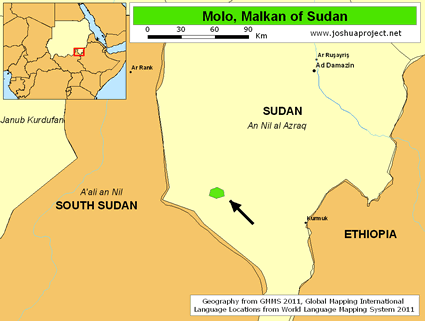The Molo, also known as the Malkan, live in the southern regions of Chad, primarily in areas near the borders with Central African Republic and Sudan. They have a long history of residing in this region, where they have developed a strong connection to the land through farming and livestock rearing. The Molo have traditionally been organized into small, autonomous villages, each with its own leadership structure. Over time, they have navigated various challenges, including external conflicts and changing environmental conditions, while maintaining their distinct identity and traditions.
The Molo people live in rural communities where agriculture is the cornerstone of their daily lives. They grow crops such as millet, sorghum, and peanuts, which are vital for their subsistence and also serve as trade items. Livestock, including cattle and goats, plays an important role in their economy and social status. Life in Molo villages is tightly knit, with extended families living close together and working collaboratively in the fields. However, the Molo face hardships related to limited access to modern infrastructure, such as schools, healthcare facilities, and reliable water sources.
The Molo people practice a mix of traditional African beliefs and Christianity. While many Molo have converted to Christianity through missionary efforts, they still hold on to elements of their indigenous spiritual practices. These include rituals connected to the land, the ancestors, and local deities, which they believe protect the community and ensure the fertility of their crops and livestock. The coexistence of these beliefs shapes the Molo's cultural and spiritual identity, influencing how they interact with the world around them.
The Molo community faces several pressing needs, particularly in the areas of education and health. Schools are sparse and often under-resourced, leading to low literacy rates and limited opportunities for children. Healthcare services are similarly lacking, with many Molo relying on traditional remedies or traveling great distances to reach medical facilities. Additionally, access to clean water remains a critical issue, as many villages depend on unreliable sources that can dry up during the dry season. Economic development is slow, leaving many families without the means to improve their living conditions or invest in their future.
Pray the hearts of the Molo people would be stirred to hunger after God, to drink of living water.
Pray for family-based movements to Christ to soon transform Molo society, blessing them spiritually and economically.
Pray for the Lord to move in the hearts of believers to give up their own rights and sacrifice their lives to see the Molo people blessed by the work of Jesus Christ, the only savior.
Scripture Prayers for the Molo, Malkan in Sudan.
AI generated
| Profile Source: Joshua Project |











